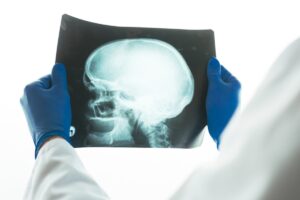Facial Fractures, What You Should Know

Facial fractures include breaks in the nose, cheekbones and upper or lower jaw. Typically caused by an acute trauma such as an auto accident, fall or sports collision, these fractures would be treated by an oral and maxillofacial specialist.
If you think you may have suffered a facial fracture, here are some questions to answer prior to your consultation.
How do I know if I have a facial fracture?
One or more of the following symptoms following a facial trauma could signal a fractured bone:
- Excessive swelling and pain
- Face feels odd or numb
- Changes in facial sensation in response to hot, cold and touch
- Loss of facial mobility
Dental X-rays will be taken to look for any facial fractures, as well as their location and severity. Facial fractures may also lead to dental trauma. A thorough evaluation from an oral and maxillofacial surgeon is a crucial step in the evaluation and treatment of fractures.
What are the treatment options?
Treatment options will vary based on the location and severity of the fracture. Small hairline fractures may be left to heal on their own, when following specific instructions from your dental professional. Significant facial fractures will likely require the bone to be reset to its natural position for healing. In these cases, surgery may be required along with titanium plates, screws or wires to hold the bone in place.
Will plates and screws be removed after the bone has healed?
In many cases, plates and other fixation devices are designed to be left in place and stay with your bone permanently. In the event of discomfort or infection, there are scenarios where these pieces could be removed.
Things to know for postop care
Along with the typical postop care instructions you would follow for any surgical procedure, specific facial fracture related precautions include:
- Follow the instructions given to you by your maxillofacial surgeon and remember to take the entire course of your antibiotics.
- Special care should be taken to avoid impacts to the affected area for several weeks following surgery. This means refraining from any sport, activity or environment that puts you at risk of physical contact to the face.






